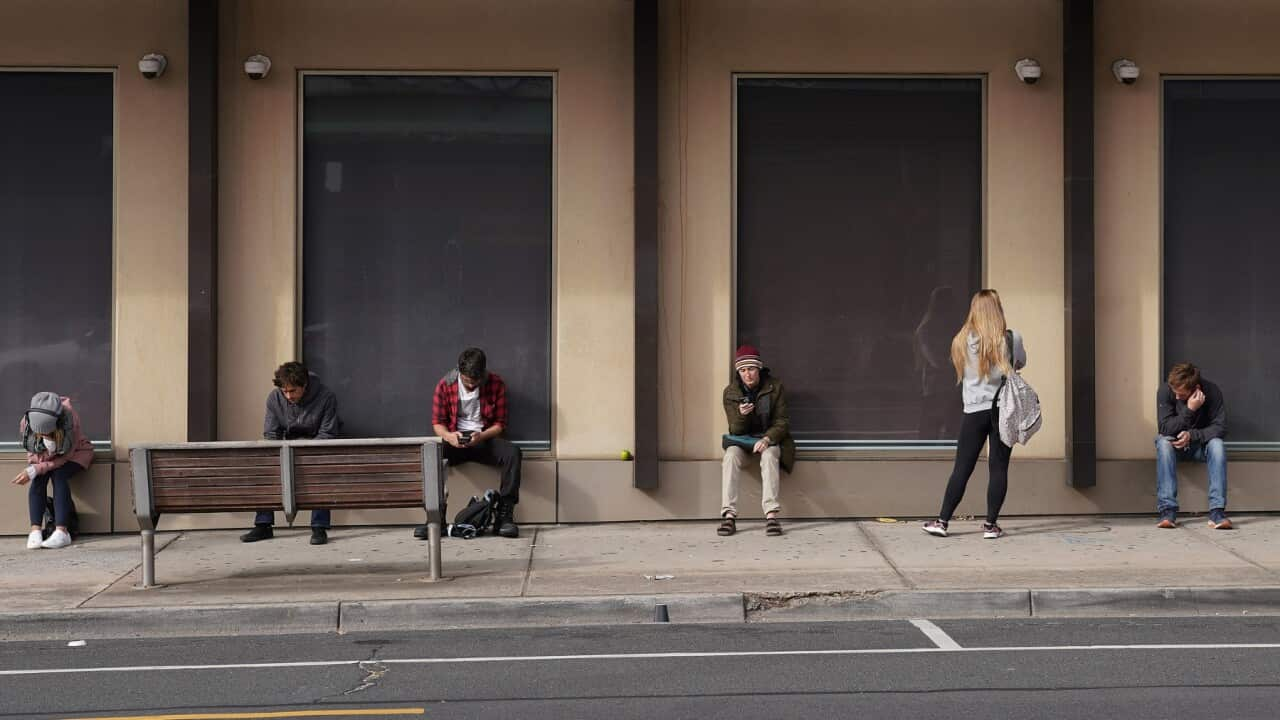Highlights
- The provides free and confidential financial counselling for those in hardship.
- You can find out about social services you are eligible for via the online directory.
- You can ask for payment deferrals from your bank if you cannot pay your bills.
Budgeting is a useful skill in normal times, when we can bring in enough money to pay the bills and feed ourselves, but National Debt Helpline financial counsellor Kane Johnson says in a pandemic survival is often the only goal for the international students and migrant workers who have been hardest hit by COVID-19.
We’re getting a lot of calls from people who have no income at all and are just struggling to pay for day-to-day essentials such as food and rent and utilities and things like that.
In late March and early April, Unions NSW conducted the “No Worker Left Behind” survey involving over 5,000 temporary visa holders.
It found that 87 per cent of respondents struggled to pay their weekly expenses.
Johnson encourages speaking to your bank to put your payments on hold if you do not have enough money to cover your day-to-day essentials.
They are legally obligated to reasonably consider that request.
Housing has become unaffordable for 30 per cent of temporary migrants who reported that they were unable to pay rent and anticipated imminent eviction in early April according to the Unions NSW survey. Tenants’ Unions of New South Wales’ policy and advocacy co-ordinator Jemima Mowbray advises renters who have been impacted by COVID-19 to speak to their landlord to seek a rent reduction.
Tenants’ Unions of New South Wales’ policy and advocacy co-ordinator Jemima Mowbray advises renters who have been impacted by COVID-19 to speak to their landlord to seek a rent reduction.

Homeless man Source: Getty Images/Benjamin Fontaine/EyeEm
That could look like a rent waiver, so waiving a portion of the rent and just reducing it or it could look like a deferred payment.
Some state and territory governments in Australia offer energy payment support for households under financial stress.
Service NSW provides $50 vouchers while Victorian residents can apply for the to access $650 on each utility type in a two-year period.
Johnson recommends speaking to your utility providers if you are in financial strife to put the payments on hold or lower the repayments to go on a payment plan rather than paying your full bill. The “No Worker Left Behind” survey also found that 65 per cent of temporary migrants had lost their job by early April.
The “No Worker Left Behind” survey also found that 65 per cent of temporary migrants had lost their job by early April.

Source: AAP Image/Dan Himbrechts
The Council of International Students Australia’s national welfare officer Kasun Kalhara says even though international students are encouraged to access their superannuation and savings, those initial savings did not factor in the extent of the pandemic’s damage to the economy.
Their predicament is exacerbated with 60 per cent of international students losing their jobs while 25 per cent had their hours significantly reduced by early April.
While 37 per cent of temporary migrants expected to rely on family, friends or a partner for support, Kalhara says that might not be a viable option as countries grapple with COVID-19.
Parents back home might have been affected by the COVID-19 as well so parents are not in a position to help international students during the COVID-19.
The Department of Home Affairs recently announced that international students can apply for a further student visa free of charge if they are unable to complete their studies within their original visa validity due to COVID-19.
Kalhara welcomes the move.
Unfortunately, who have already applied will not be eligible for a refund but who are going to apply, there is an opportunity for you to save your money for your living expenses.
While the federal government has asked those struggling to dip into their superannuation, Johnson says decisions should not be made lightly and people should always seek financial advice before doing so.
If you take out the $10,000 of your super, you are actually losing a lot more in the long run.
Australians are permitted to withdraw their superannuation funds in two applications, once before June 30 and again before December 31.
However, temporary migrants were only able to withdraw once before the 2019/20 financial year.
There are other ways you can potentially access your super, it is actually quite difficult but give our service a call and we can talk you through that in some detail.
The last thing those in financial distress need is a hefty fine.
Legal Aid NSW’s assistant manager of Work and Development Order Service Linda Meyns says a disproportionate number of people have been imposed with public health order fines of $1000 in central and western Sydney in particular, due to a lack of proficiency in English and understanding of local rules and regulations.
New South Wales’ Work and Order Scheme has been running for 10 years with over 2000 community organisations involved to allow you to pay your fines through volunteering services or attending community programmes.
Some states and territories also provide a similar service.
So anyone who’s in acute economic hardship or who has a mental illness or other grounds of eligibility, they can do a WDO and you can clear all the fines.
Infoxchange is a digital and technology social enterprise which runs online directory Ask Izzy, which connects people to over 300,000 social services around Australia.
Its CEO David Spriggs says the directory has experienced a surge in demand from temporary migrants who find the Australian social service system difficult to navigate during COVID-19.
He says people are mostly searching for access to free food services, other material aid and financial assistance.
In response to the coronavirus economic situation, the Australian Financial Security Authority has increased the debt threshold required for creditors to apply for a bankruptcy notice against a debtor from $5000 to $20,000.
Johnson says many considering bankruptcy often realise there are better options available without the same long lasting impact after speaking to a financial counsellor at the National Debt Helpline. For free and confidential financial counselling, ring the National Debt Helpline on1800 007 007 Monday to Friday from 9:30am to 4:30pm.
For free and confidential financial counselling, ring the National Debt Helpline on1800 007 007 Monday to Friday from 9:30am to 4:30pm.

Source: AAP Image/Scott Barbour
You can access mostly free interpreting service by calling the national translating and interpreting service on 13 14 50.
To find out about the social services you are eligible for, go to the Ask Izzy online directory at .
You can also ask your local Legal Aid for advice on how you may be able to clear your fines from community services.







